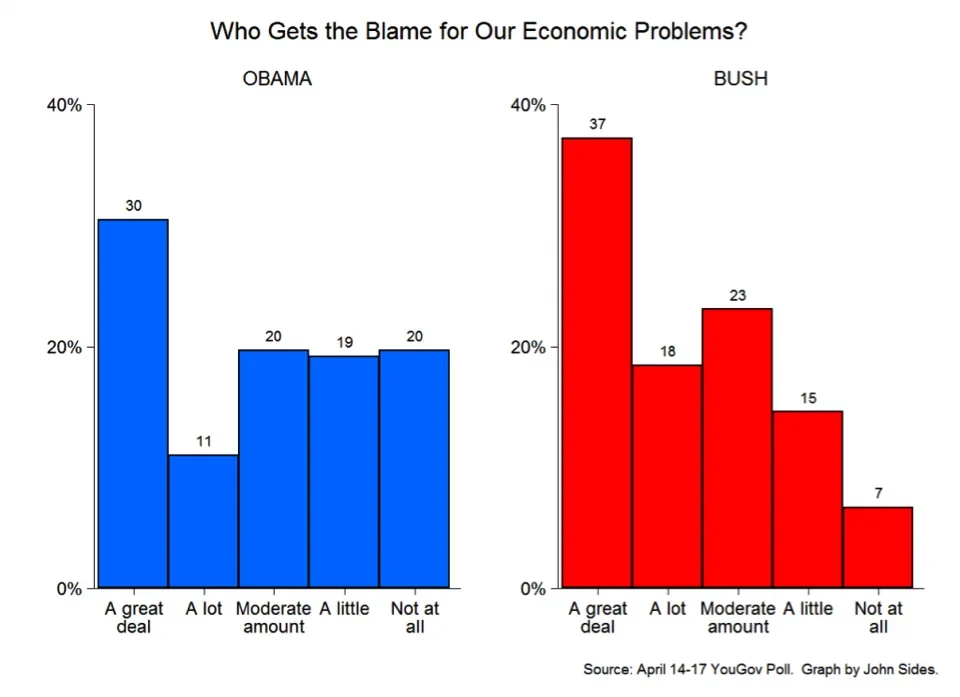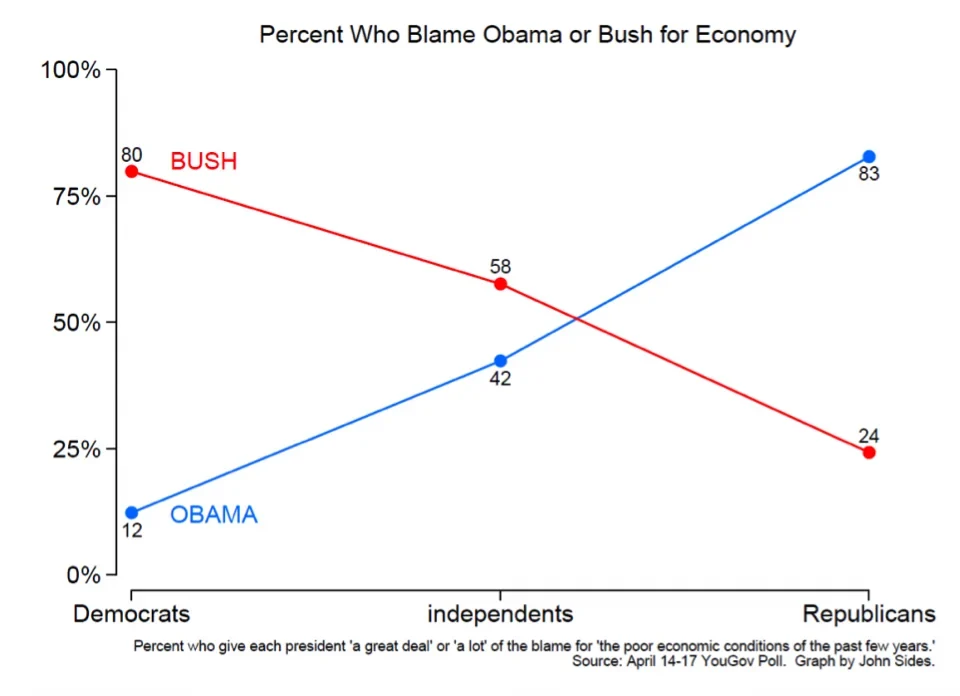The economy seems to be weakening, and Republicans are eager to blame Obama. This is by-the-books political messaging: the party opposing the incumbent president should talk about the economy when its weak. But the success of the attack, as Steve Kornacki notes, may depend on whether Obama really gets the blame for the weak economy.
To this point, more Americans have blamed George W. Bush, during whose tenure the recession and financial crisis began, than Barack Obama. This was true in a series of Gallup polls between July 2009 and September 2011. For example, in September 2011 69% said Bush deserved "a great deal" or "a moderate amount" of blame. Just over half (53%) said that of Obama. In a more recent poll, conducted by the Washington Post in January 2011, respondents were given the option of choosing whether Obama or Bush was "most responsible for the country's economic problems." Many more chose Bush (54%) than Obama (29%).
New data from an April 14-17 YouGov poll confirms that Obama is still winning the blame game.

As the graph shows, 56% gave Bush a great deal or a lot of the blame, while only 41% gave Obama that much blame. This 15-point gap is nearly identical to what Gallup found in September, albeit with a differently worded question and response categories. Looked at a different way, 47% of voters blamed Bush more than Obama, 21% blamed them equally, and 32% blamed Obama more than Bush.
Naturally, Democrats and Republicans do not see eye-to-eye on the question of blame:

The vast majority of Democrats (80%) blame Bush, while large numbers of Republicans (83%) blame Obama. The partisan bias isn't quite symmetric, as there are more Republicans who blame Bush (24%) than Democrats who blame Obama (12%). Pure independents, those with no leaning toward either party, tend to blame Bush more than Obama.
This tendency to blame the previous incumbent more than the current one is nothing new. The same was true when Bush himself was president. Early in Bush's first term, from March through November 2001, the country also experienced a recession. Because the recession came so early in Bush's term, and because the economic slowdown had begun late in Clinton's second term, there was debate about who to blame.
Two different polls -- by the Washington Post in February 2002 and by Princeton Survey Research Associates in May 2003 -- showed that, in fact, Clinton was blamed more than Bush. In the Post poll, 78% of pure independents thought that the economy was “not so good” or “poor.” Among this subset of independents with a negative view of the economy, 69% believed Clinton deserved “a great deal” or “a fair amount” of blame, but only 48% believed this of Bush. Similarly, among the minority who thought the economy was doing well, more credited Bush than Clinton. In the PSRA poll, 30% of independents thought Clinton deserved "most" or "a lot" of blame while 22% thought Bush did. Even though Bush, like Obama now, was well into his first term, these voters still saw the prior president as more responsible for the country's economic problems.
The ultimate question for Obama is: could some voters' willingness to blame Bush more than Obama actually help him win reelection? Here is one way to answer this question. Take the difference between how much blame voters assign to Obama and Bush. This serves as a measure of Obama's blame advantage or disadvantage relative to Bush (where, as noted above, Obama has a net advantage). Using that measure -- as well as other relevant factors, including party identification, ideology, sex, race, and income -- predict how much people approve of the job Obama is doing as president and whether they would vote for him and not Romney.
Then "erase" any blame advantage for either Bush or Obama, which assumes a world in each every person blamed Bush and Obama equally. What would happen in this world? First, Obama's job approval would decline by about 11 points. Second, his poll standing relative to Romney's would decline by 3 points. Both of these declines are statistically significant and substantively important.
To be sure, this exercise is purely hypothetical. Life isn't a laboratory, and we can't replay Obama's first 3 years and have voters blame him less or more than they do in reality. Nevertheless, Obama's lead in the blame game appears to be helping him in the horserace.









